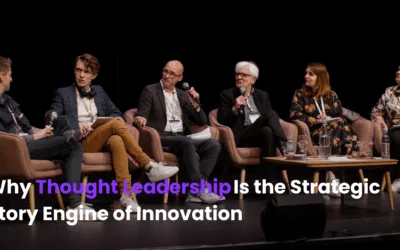Search is no longer just about Google.
Today’s digital visibility is shaped by AI-first search engines like ChatGPT, Bing Chat, and Perplexity. These tools are redefining how people discover, validate, and act on information. Yet there’s no clear dashboard, no Yoast plugin, no reliable “rank #1” promise. For strategic marketers and founders, it’s unfamiliar terrain—but it’s also an opportunity.
We’ve spoken with SEOs, founders, and growth leaders to decode what actually works in this emerging space. The good news? Some patterns are forming. The challenge? They’re not what traditional SEO taught us.
Don’t Sleep on Bing: Your Visibility Depends on It
ChatGPT’s browsing tools and Microsoft Copilot pull live data from Bing, not Google. That means even if your site ranks well on Google, it may be invisible to AI tools unless you’re also optimised for Bing.
Most organisations overlook Bing entirely, but we’re entering a world where Bing is the backend of modern discovery. And this isn’t hypothetical – our tests show that Bing-friendly pages surface more often in AI-generated answers. That means technical SEO must now include Bing Webmaster Tools, XML sitemaps, and ensuring your content renders correctly in Microsoft’s index. It’s not a side quest. It’s the new table stakes.
Think Like a Researcher, Not a Keyword Tool
Generic keywords won’t cut it. AI engines favour specificity because their goal is not to generate broad links – they’re designed to answer questions. If your content isn’t helping someone make a decision or solve a problem, it probably won’t appear in an AI-generated summary. And, in fact, you’ll need to be generating much more content.
This means long-tail, high-intent keywords are your new growth levers. Think less about “CRM” and more about “best CRM for remote sales teams with limited IT support.” The more contextually rich your content is, the more likely it is to be surfaced. At Disruptors Co, we’re helping businesses build intent-rich content libraries that mirror real buyer questions, not abstract search terms – so that means checklists, how-to guides, case studies and more. This means we have to improve our mid-funnel game.
Structure Signals Trust – Use It
Adding structured data like FAQ schema isn’t just a legacy SEO move – it is an essential building block. Tools like ChatGPT parse pages differently than a search engine crawler, but they still rely on signals to determine relevance and clarity – and schema provides exactly that.
When GPT models evaluate content, they favour answers formatted cleanly, contextually, and clearly. We’ve seen content with well-implemented FAQ schema surface faster and more reliably in AI summaries than unstructured competitors. Think of it as building your content not just for humans or search engines – but for machines trying to emulate both.
And, for sure, the Google E-E-A-T principles still apply.
Go Deep, Not Wide: Thematic Content Wins
One-off blog posts don’t build authority in the AI search landscape. What’s working now are thematic clusters – a central pillar page surrounded by linked, supporting assets. AI models use semantic linking and topic modeling to evaluate depth and context, which means structured content hubs outperform scattershot publishing.
A successful cluster might include a thought leadership article, a “how-to” guide, internal FAQs, case studies, and tools or checklists – all anchored to a single topic. For example, a growth-stage CRM startup we supported used a structured content hub to own the topic of “remote team sales enablement.” That hub now surfaces consistently in Perplexity and Bing summaries – not because of backlinks, but because of relevance.
Get Credible in the Right Places – AI Reads the Crowd
AI doesn’t just read your website. It reads what others say about you. Tools like ChatGPT and Perplexity lean heavily on Reddit, Hacker News, Quora, Medium, and Stack Overflow to validate reputational signals and fill knowledge gaps. In many ways, these have become the “peer review” layer of AI citation.
That means showing up in these communities is no longer just good PR, it’s essential for AI-era discoverability. A well-positioned Reddit comment, a Medium post linked in Hacker News, or even a Quora answer that earns traction can now be cited in real-time queries. For marketing leaders, this is a lightweight, but strategic, lever to build authority without needing a massive backlink budget.
This Is Not Just a Tactic Shift – It’s a Mindset Shift
Traditional SEO was about ranking for algorithms. AI-first search is about earning trust from models trained to mimic human decision-making. This shift requires more than tweaking keywords – it calls for purposeful content, reputation strategy, and structured digital storytelling. All the work you’ve done to build reputation on social channels will put you in a good place when it comes to AI.
At Disruptors Co, we help founders, marketing leaders, and public sector innovators reposition their content, presence, and value propositions for this new landscape. Whether you’re trying to build a GPT-friendly brand footprint, drive visibility across AI platforms, or rethink your go-to-market strategy for this new era



